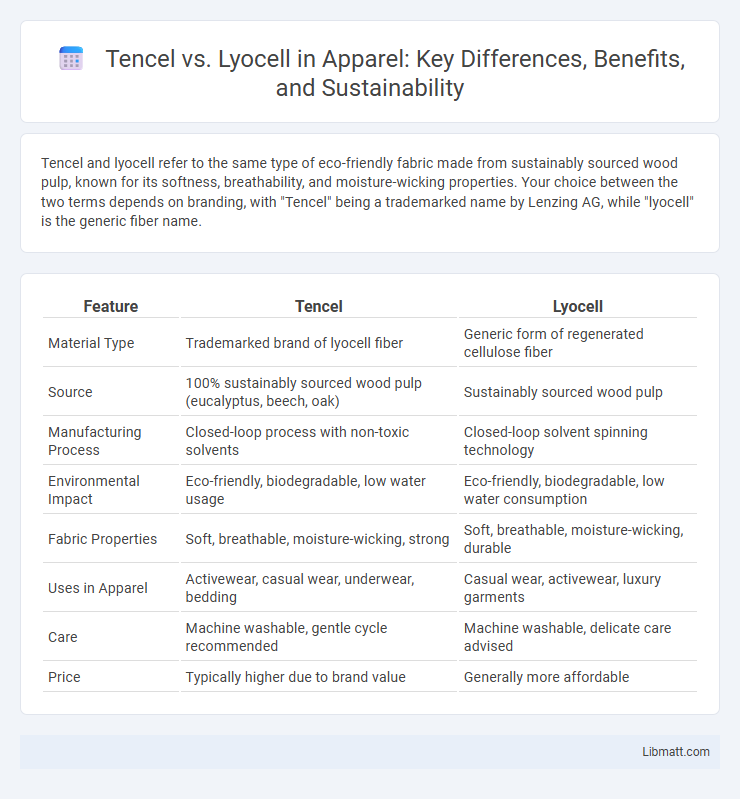Tencel and lyocell refer to the same type of eco-friendly fabric made from sustainably sourced wood pulp, known for its softness, breathability, and moisture-wicking properties. Your choice between the two terms depends on branding, with "Tencel" being a trademarked name by Lenzing AG, while "lyocell" is the generic fiber name.
Table of Comparison
| Feature | Tencel | Lyocell |
|---|---|---|
| Material Type | Trademarked brand of lyocell fiber | Generic form of regenerated cellulose fiber |
| Source | 100% sustainably sourced wood pulp (eucalyptus, beech, oak) | Sustainably sourced wood pulp |
| Manufacturing Process | Closed-loop process with non-toxic solvents | Closed-loop solvent spinning technology |
| Environmental Impact | Eco-friendly, biodegradable, low water usage | Eco-friendly, biodegradable, low water consumption |
| Fabric Properties | Soft, breathable, moisture-wicking, strong | Soft, breathable, moisture-wicking, durable |
| Uses in Apparel | Activewear, casual wear, underwear, bedding | Casual wear, activewear, luxury garments |
| Care | Machine washable, gentle cycle recommended | Machine washable, delicate care advised |
| Price | Typically higher due to brand value | Generally more affordable |
Understanding Tencel and Lyocell: An Overview
Tencel and lyocell share the same fiber type, both derived from sustainably sourced wood pulp, making them eco-friendly alternatives to traditional fabrics. Tencel is a branded form of lyocell produced by Lenzing, ensuring higher standards in environmental and manufacturing processes. Understanding the differences can help you choose the best fabric for comfort, moisture-wicking, and durability in your clothing and home textiles.
What Is Tencel?
Tencel is a branded form of lyocell, a sustainable fabric made from wood pulp, primarily eucalyptus trees, known for its softness, breathability, and moisture-wicking properties. Manufactured through a closed-loop process, Tencel fibers ensure minimal environmental impact by recycling water and solvents, making it an eco-friendly choice for clothing and bedding. Your preference for Tencel guarantees a biodegradable, hypoallergenic fabric that offers durability and comfort.
What Is Lyocell?
Lyocell is a sustainable fiber made from wood pulp, primarily derived from eucalyptus, beech, and spruce trees, using a closed-loop production process that recycles water and solvents. It is a type of rayon known for its softness, breathability, and moisture-wicking properties, making it popular in eco-friendly textiles and apparel. Often used interchangeably with Tencel, lyocell emphasizes environmental benefits and durability in textile manufacturing.
Tencel vs Lyocell: Key Similarities
Tencel and lyocell are both sustainable fibers produced from cellulose found in wood pulp, primarily sourced from eucalyptus trees. They share an eco-friendly closed-loop production process that recycles water and solvents, minimizing environmental impact. Both fibers provide excellent breathability, moisture-wicking properties, and a soft, silky texture ideal for comfortable, durable textiles.
Tencel vs Lyocell: Major Differences
Tencel and lyocell refer to the same type of fabric made from sustainably sourced wood pulp, but Tencel is a branded version produced by Lenzing AG with specific eco-friendly processes and certifications. Major differences lie in Tencel's stricter environmental standards, higher quality control, and smoother fiber texture compared to generic lyocell. Tencel also tends to offer enhanced moisture management and softness, making it a preferred choice in premium textile applications.
Production Process: Tencel vs Lyocell
Tencel and lyocell both originate from wood pulp, but Tencel is a branded form of lyocell produced by Lenzing using a closed-loop production process that recycles 99% of the solvent, making it more environmentally sustainable. The lyocell production process involves dissolving wood pulp with a non-toxic solvent and then spinning it into fibers, but Tencel's proprietary method optimizes water and energy use. Choosing products made from Tencel ensures your textile is crafted with higher environmental standards in comparison to generic lyocell fibers.
Environmental Impact of Tencel and Lyocell
Tencel and lyocell share a sustainable production process that minimizes environmental impact through closed-loop manufacturing, recycling over 99% of solvents used. Both fibers are derived from sustainably managed eucalyptus forests, requiring less water and energy compared to conventional cotton, significantly reducing carbon footprint. The biodegradable nature of Tencel and lyocell further supports eco-friendly disposal, making them favorable choices in sustainable textiles.
Durability and Performance: A Comparative Analysis
Tencel and lyocell, both made from sustainably sourced wood pulp, offer exceptional durability and performance characterized by high tensile strength and resistance to wear. Tencel, a branded form of lyocell, undergoes a specialized production process that enhances moisture absorption and breathability, making it ideal for activewear and long-lasting textiles. Your choice between the two depends on desired fabric qualities, but both excel in resilience, softness, and eco-friendly attributes.
Applications in Fashion and Textiles
Tencel and lyocell are often used interchangeably in fashion and textiles due to their shared eco-friendly production and superior comfort. Tencel, a branded form of lyocell produced by Lenzing AG, is favored for its softness, moisture-wicking properties, and durability, making it ideal for sustainable clothing lines, activewear, and luxury fabrics. You can find both fibers in a range of applications, from casual wear and bedding to high-performance sports apparel, where breathability and environmental impact are key considerations.
Which Is Better: Tencel or Lyocell?
Tencel is a branded type of lyocell fabric produced by Lenzing AG, known for its sustainable production process using environmentally friendly solvents and closed-loop systems that recycle water and chemicals. Both Tencel and generic lyocell offer similar benefits like breathability, softness, and moisture-wicking properties, but Tencel often holds a higher reputation for superior quality and consistent fiber strength due to stricter manufacturing controls. Consumers seeking eco-friendly, durable, and premium-quality fibers typically consider Tencel the better option compared to standard lyocell.
Tencel vs lyocell Infographic

 libmatt.com
libmatt.com